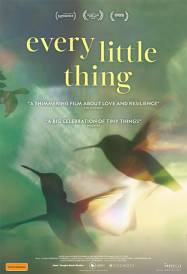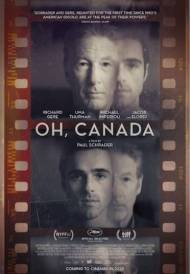Tom Volf's Maria Callas
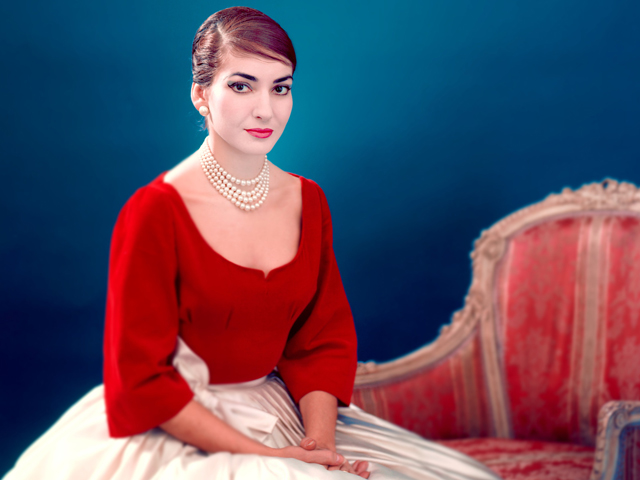
The life story of the legend told completely in her own words.
Cast: Fanny Ardant, Joyce DiDonato, Maria Callas
Director: Tom Volf
Genre: Documentary, Biography
Rated: PG
Running Time: 113 minutes
Synopsis: Tom Volf's Maria By Callas is the first film to tell the life story of the legendary Greek/American opera singer completely in her own words.
Told through performances, TV interviews, home movies, family photographs, private letters and unpublished memoirs"nearly all of which have never been shown to the public"the film reveals the essence of an extraordinary woman who rose from humble beginnings in New York City to become a glamorous international superstar and one of the greatest artists of all time.
Assembling the material for the film took director Volf four years of painstaking research, which included personal outreach to dozens of Callas's closest friends and associates, who allowed him to share their personal memorabilia in the film. When recordings of Callas's voice aren't available, Joyce DiDonato, one of contemporary opera's biggest stars, reads her words.
Callas believed that two different women lived in her: Maria, the woman who longed for a normal life; and Callas, the public figure and icon, from which an adoring public expected a transcendent experience every time she stepped onstage, and which could quickly become outraged when they felt she had given them anything less. Through Volf's intimate portrait of Callas, we see that some commonly held beliefs about Callas, notably her reputation as a "tempestuous" diva, have no basis in fact. Maria By Callas revisits many of the most notable controversies of Callas's life, from the "Rome Cancellation" to her conflict with the Metropolitan Opera's Rudolf Bing, and demonstrates that, while Callas was a demanding perfectionist, she was neither capricious nor someone who made trouble for its own sake. The film also sheds new light on Callas's relationship with Aristotle Onassis, the supreme love of her life.
Instead of trying to sum up her vast musical repertoire through countless clips, Volf instead presents some of her most important arias in their entirety. Each aria is chosen for its significance for the period in Callas's life during which she sang them. These arias include: "Casta Diva" ("Norma"), "Love is a Rebellious Bird" ("Carmen"), and "I Lived for Art, I Lived for Love" ("Tosca"). Through hearing these full versions of Callas's performances, the audience is able to experience a direct, unmediated response to her music, as the audiences of her time did. Maria By Callas is a loving portrait of one of history's most extraordinarily talented women, told in a way that is revelatory, unprecedented, and authoritative.
Maria Callas
Release Date: February 7th, 2019
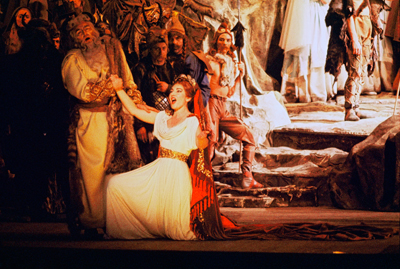 About The Production
About The Production
Tom Volf was not particularly interested in opera until a chance experience changed the trajectory of his life. "I wasn't listening to classical music. I was a very typical young person, listening to pop songs and rock." One night in 2013, while walking by New York's Metropolitan Opera, he impulsively purchased a standing room ticket. The opera was Donizetti's "Maria Stuarda," starring the celebrated American mezzo-soprano Joyce DiDonato (who, in the film, gives voice to Maria Callas's letters and memoirs). "It wasn't just the magnificent music," he says, "it was like a concert and theater and cinema came together in one place. All of that made my experience so strong, powerful, and mind-blowing."
Reeling from the performance, Volf spent a night on the internet researching Italian opera, which led him to a recording of Maria Callas singing the aria "Spargi d'amaro pianto" from Donizetti's "Lucia di Lammermoor." Hearing Callas's voice for the first time took Volf's exploration of opera onto a new path. "As soon as I heard Maria Callas, I was no longer looking at Italian opera in general," he says. "I was focused on her."
Volf began his exploration of all things Callas with a deep dive into social media, where he connected with people from all over the world who knew more about Callas than he did, including people in the United States, Europe, Asia, Latin America, and Australia. "I understood very quickly that she was not only a phenomenon in her lifetime, she was still a phenomenon in 2013, nearly four decades after her death," says Volf. Eventually he started meeting in person with some of the Callas enthusiasts who lived in New York, including one who had actually known her. "I came for coffee and I sat there all afternoon listening to stories of his experiences with her," he says. "And that was very inspiring, like opening up a world that didn't exist anymore."
After a few months of meeting people, and reading books and watching documentaries, Volf was still unsatisfied. "There are so many people who wrote about her, and so many people who did documentaries about her, but in the end, none of them satisfied my thirst to get to know her and understand her," he says. "And that's what drove my decision to make a film myself. I wanted to make the film that I wanted to watch."
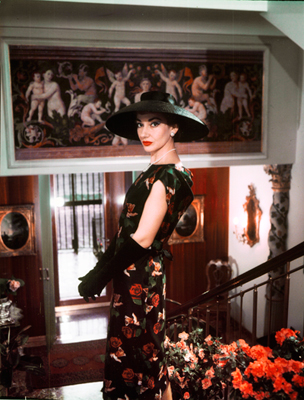 Volf began traveling the globe for over a year, filming interviews of thirty of Callas's friends, in almost a dozen countries. It was an exhausting effort, first to find people and then to persuade them to talk to him, as many of the people closest to her, like Callas's maid, Bruna Lupoli, and her butler, Ferruccio Mezzadri, had refused to be interviewed for years. Principal among the people he reached out to at the beginning were her longtime friend Nadia Stancioff (author of Maria Callas Remembered) and Georges Prêtre, one of her favorite conductors. "I had a very naïve approach, which actually helped," says Volf. "I was not a fan, a collector, or a groupie. I was coming from a very genuine and humble place, which made it easier to build up relationships of trust."
Volf began traveling the globe for over a year, filming interviews of thirty of Callas's friends, in almost a dozen countries. It was an exhausting effort, first to find people and then to persuade them to talk to him, as many of the people closest to her, like Callas's maid, Bruna Lupoli, and her butler, Ferruccio Mezzadri, had refused to be interviewed for years. Principal among the people he reached out to at the beginning were her longtime friend Nadia Stancioff (author of Maria Callas Remembered) and Georges Prêtre, one of her favorite conductors. "I had a very naïve approach, which actually helped," says Volf. "I was not a fan, a collector, or a groupie. I was coming from a very genuine and humble place, which made it easier to build up relationships of trust." As someone too young to have lived through Callas's heyday, Volf was able to take a fresh approach, avoiding the clichés and gossip that whirled around Callas during her lifetime and after. "There were things, that, just because they had been repeated so often, had come to be solidified in the common knowledge as being the truth," says Volf. "Whereas actually these things were not at all true to begin with. My journey of discovery was not under the influence of the things I had read, or people who didn't know her. My journey came first and foremost from the people who were her friends and loved ones, and who had only direct testimonials about her."
One thing that Volf hadn't expected is that at every one of these meetings, Callas's friends opened up their cupboards and pulled out 8mm films, audio tape reels, letters, and photos. He quickly realized that a large part of this memorabilia was previously unseen and had never been shown in public before.
After a year and a half, Volf took a break from interviews to take stock of what he had done. He discovered that the materials he had been given were more interesting to him than the interviews he conducted. "Suddenly it was like opening this big chest," he says. "I didn't realise that there was so much." Volf realized there was the potential for him to make a film much more ambitious than the one he had previously envisioned. He could use this material to make a film that was 100% Callas in her own words. "I felt that this would be the best way for the public to get to know intimately the woman behind the legend"who she truly was, what her feelings were about, and what she was made of."
Choosing this new path involved a great deal of risk. "It meant putting aside everything I had filmed for a year and a half, over sixty hours of rushes, and starting from scratch," says Volf. The filmmaker worried that his interviewees would be upset to hear that their interviews wouldn't be in the film, but instead they saluted his new approach. "They told me it was exactly what she would have wanted," says Volf. As the director needed as much material as possible in order to make the film stand on her voice alone, he had to ask her friends again for even more memorabilia. For the next year, Volf began a new odyssey through every possible archive and collection and institution that he could find in the world. "It was a big bet I was making," says Volf. "I was definitely worried I wouldn't have enough to make this film."
Perhaps the most important find was Callas' 1970 interview on "The David Frost Show," something previously thought to have been lost for half a century. Volf discovered, that, in fact, her butler, Ferruccio Mezzadri, kept a copy. Volf was so taken with her conversation with Frost that he ended up constructing the film as a series of flashbacks from the 17-minute interview" all the other interviews, letters, visual materials and performances are shown in chronological order. "When we come back to the Frost interview, it's like we're coming back to a room where we're having tea with Maria," he says. "And then we go back to her life." Maria's comment to Frost, "There are two people in me actually, Maria and Callas," was such a revelation to Volf's understanding of Callas, that he opened the film with it, and made her duality the central theme of the film. "We constantly go from Maria to Callas and from her personal life to her career and public life," says Volf. "We get a feeling for how the two communicate and sometimes struggle, and sometimes sacrifice one to the other."
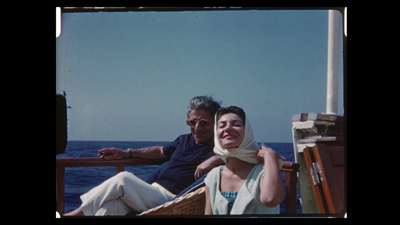 When Volf came across original color photographs of events, especially of performances, he decided to colorize the black and white footage to match it. "I wanted to have exactly the color that was there at the time, as a way of authentically recreating those moments," he says. "Every time we did it, it was never for the sake of colorization, it was for the sake of restoration." When Volf was scanning original 8mm home movie reels, he often kept them with their original sprocket holes and frames. "I felt it was another way for us to feel that we are here with something from that time, from the '50s and the '60s," says Volf. "It gives you a sense of something rare and personal and very fragile."
When Volf came across original color photographs of events, especially of performances, he decided to colorize the black and white footage to match it. "I wanted to have exactly the color that was there at the time, as a way of authentically recreating those moments," he says. "Every time we did it, it was never for the sake of colorization, it was for the sake of restoration." When Volf was scanning original 8mm home movie reels, he often kept them with their original sprocket holes and frames. "I felt it was another way for us to feel that we are here with something from that time, from the '50s and the '60s," says Volf. "It gives you a sense of something rare and personal and very fragile." Because there are no opera experts in the film to explain Callas's unique gifts as a singer, each member of the audience must make their own judgment"by listening to her. "You don't need, and this is my deep belief, any expert, or so-called expert, or music critic, to tell you she was great," says Volf. "I thought that if I would be able to make the film in a way that audience understands from their own feelings, and their own minds and hearts, how great she was, then I would have fulfilled my mission." As Callas told Frost: "If someone really tries to listen to me, he will find all of myself there." The idea that Maria's truth as a human being is revealed through her art is what prompted Volf to call the film Maria By Callas rather than Callas By Maria.
Rather than present brief excerpts of Callas's prodigious repertoire in the film, Volf decided to select a few arias, performed in their entirety so that the audience could get the complete experience of her performances, exactly as audiences did in her day. He underlined this through his approach to sound design, which he conceived to reproduce the unique reverberations of an opera house or a concert hall. "I could have put in hundreds of examples of all of the singing she did in her life, and it would have been like a fireworks display of her capacities," says Volf, "but whenever she decided to perform an opera, or an aria in concert, it was a meaningful choice for her. It's no coincidence that she decides to sing 'Carmen' for the first time in her life at the very moment that her romance with Onassis is starting. In fact, all of the arias seen in the film have the same kind of double meaning for the woman and the public figure." As the poetry of the arias is so essential to the audience making these kinds of connections, new translations were commissioned for the U.S. release with special consultation from a dramaturge at the Metropolitan Opera.
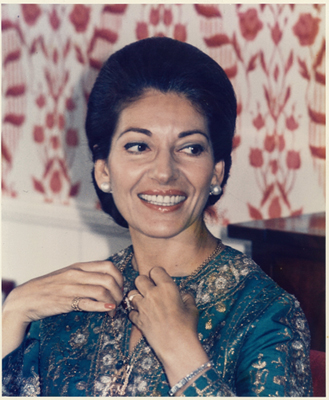 As the film proceeds and the audience learns more about Callas, the films shows her more and more in close-up, as at the same time her interpretations of the music becomes more intimate and revealing. "As you get to know her better, you get to understand and hear her singing in a very different way," says Volf. "It's not only singing, it's her telling you something about herself." In a few occasions, Volf does bend his rule and lets others speak besides Callas, but it was important to him that all of the interviews were broadcast in her lifetime, things she may have seen. "I wanted the film to be a little bit like a time machine for the audience," says Volf. "Bringing in contemporary interviews would have disrupted that. But at some very precise moments, I felt that we needed a couple of extra things." One was the interview with Callas's singing teacher and beloved mentor, Elvira de Hidalgo, which was done for a TV program that had Callas as the main guest. Another was the words of the enraptured young Callas fans waiting in line in 1965 in New York for Callas concert tickets, which were part of television news reports that Callas would have seen at the time. "That little piece of the young men, and the people sleeping in line, tells you so much," says Volf. "It may not be her words, but it's her world."
As the film proceeds and the audience learns more about Callas, the films shows her more and more in close-up, as at the same time her interpretations of the music becomes more intimate and revealing. "As you get to know her better, you get to understand and hear her singing in a very different way," says Volf. "It's not only singing, it's her telling you something about herself." In a few occasions, Volf does bend his rule and lets others speak besides Callas, but it was important to him that all of the interviews were broadcast in her lifetime, things she may have seen. "I wanted the film to be a little bit like a time machine for the audience," says Volf. "Bringing in contemporary interviews would have disrupted that. But at some very precise moments, I felt that we needed a couple of extra things." One was the interview with Callas's singing teacher and beloved mentor, Elvira de Hidalgo, which was done for a TV program that had Callas as the main guest. Another was the words of the enraptured young Callas fans waiting in line in 1965 in New York for Callas concert tickets, which were part of television news reports that Callas would have seen at the time. "That little piece of the young men, and the people sleeping in line, tells you so much," says Volf. "It may not be her words, but it's her world." Not every event in Maria Callas's life made it to the finished film. "Having to sum up such an incredible life as hers, with so many events, into a film under two hours, was a big challenge," says Volf. "It was a nightmare on many levels to choose what to keep and what not to keep." Among other things, Volf and editor Janice Jones decided to bypass some of her teenage years, her return to America before she went to Italy, and the first years of her success in Italy. "I tried to sum up all of that in a four-minute sequence, so it is still in the film, but I wasn't able to stay there as long as I wanted," he says. Among the things that were edited out was a half-hour section on Callas's much discussed weight loss. "You see her in 1952 in a private film shot from the backstage of one of her first "Norma" performances and she's rather heavy," says Volf. "But then you see her a year later making her debut at La Scala and she's super thin and gorgeous. It's understandable for the eye of the audience, we just don't dwell on it." Despite the editing challenges, Volf never envisioned the film as a comprehensive "History Channel" series: "Our goal was to bring together enough of the different events of her personal and public life and her art to give you, by the end, a feeling of who she was."
One event the film does address is Callas's notorious "Rome Cancellation," an event that made worldwide news, was extremely traumatic for her, and was completely misunderstood. "What people didn't realize then, and I hope the film shows, is that the real catastrophe is not that she stopped the performance and couldn't carry on"it's the fact that she went on in the first place," says Volf. "It was very clear to her, and to everyone, that she was not in shape to do that performance, but they pushed her to go onstage. She already had several so-called 'scandals' from the year before, cancellations because of health issues also. There was such an expectation that the people just refused to believe that she canceled for health reasons. They unanimously thought, 'She's being tempestuous, she's throwing a tantrum, she's doing this on purpose.' And interrupting a night like that, with all the celebrities and the Italian President there, is comparable today to stopping the Super Bowl after the half-time show." Rome and the conflict with Bing, which led to her being "fired" from the Met, had enormous repercussions for Callas, as she was no longer allowed to sing in Rome, and she was treated with hostility at other opera houses, like La Scala in Milan.
Based on his voluminous conversations with people who knew her well, Volf feels certain that Callas's reputation for being a diva is entirely unwarranted. "I think some people were confused between the great drama she was doing onstage and the drama offstage," says Volf. "The "tempestuous" reputation was not something that came up all of a sudden, but was built up over a few years with the various so-called 'scandals.' Each of these instances, as you can see it the film, came up as a consequence of an injustice made to her." As the film demonstrates, Callas was a perfectionist with extremely high standards, who pushed for good conductors, singers, and productions, which was the basis for her conflict with Rudolf Bing of the Metropolitan Opera. "She could be demanding, but she was never capricious or someone who would throw a tantrum for no reason," says Volf. "It's the press who created that Diva character, by covering her unfairly. But once she grew to have that reputation, it was impossible for her to challenge it."
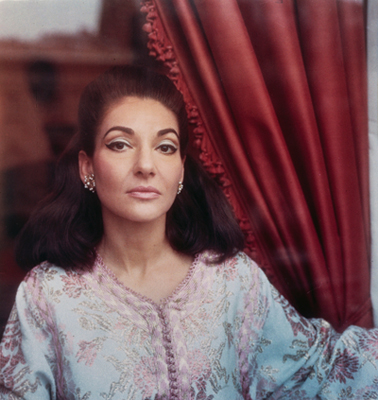 Volf feels that the controversy and attacks spoiled Callas's joy of performing, and caused her to stop doing the work with the passion she had earlier in her career. It also increased her fear and anxiety about what might happen onstage, which resulted in a huge strain on her voice. "Maria knew that if anything went wrong, she'd be blamed again," says Volf. "She was once asked, 'Do you have stage fright?' and she said, 'In the middle of my career, never, and now it's terrible.'" Soon after the 1958 Rome and Bing incidents, Callas went on the cruise with Aristotle Onassis that would bring them together forever. "She was fed up with being in the spotlight, and all that came with it," says Volf. "Probably she wouldn't have even started up with Onassis if it wasn't at that precise time of her life. She goes on the cruise and everything is completely different. There is no more stress, and she gets to take care of her life as a woman, and be loved for Maria, not Callas. Because of Onassis, she gets a chance to fulfill her personal life, so she makes a happy decision to leave the stage for a while."
Volf feels that the controversy and attacks spoiled Callas's joy of performing, and caused her to stop doing the work with the passion she had earlier in her career. It also increased her fear and anxiety about what might happen onstage, which resulted in a huge strain on her voice. "Maria knew that if anything went wrong, she'd be blamed again," says Volf. "She was once asked, 'Do you have stage fright?' and she said, 'In the middle of my career, never, and now it's terrible.'" Soon after the 1958 Rome and Bing incidents, Callas went on the cruise with Aristotle Onassis that would bring them together forever. "She was fed up with being in the spotlight, and all that came with it," says Volf. "Probably she wouldn't have even started up with Onassis if it wasn't at that precise time of her life. She goes on the cruise and everything is completely different. There is no more stress, and she gets to take care of her life as a woman, and be loved for Maria, not Callas. Because of Onassis, she gets a chance to fulfill her personal life, so she makes a happy decision to leave the stage for a while." Volf notes, that for Maria, Onassis was the great love of her life, perhaps an even greater one than her love of singing: "In her interview with Barbara Walters in the film, she says, 'There was only one man, Mr. Onassis, a non-husband.' That is very funny, because of course she couldn't say he was the only man, as she had a husband, Battista Meneghini, for over ten years. But aside from her husband, he was the one and only. He always remained that. Despite the break-up, despite his marriage to Jackie, the relationship continued. They were soul mates."
Grammy Award-winning opera star Joyce DiDonato acts as the voice of Callas in the film, reading from her letters and memoirs. Having DiDonato act as Maria's voice has deep meaning for Volf, as she brings his personal story full circle. "Had it not been for Joyce singing that night in 2013 at the Met, I might have never fallen in love with opera and discovered Callas, and decided to make the film," he says. More importantly, because DiDonato comes from the same world, she was able to identify with Callas and understand her in a way that few people could aspire to. DiDonato and Volf agreed that she should not try to imitate Callas's voice. "She doesn't try to play Callas, but she lives those words as if she had written them herself," says Volf. "It is almost as if there's only one voice in the film, the voice of Maria, and Joyce brings those words to life by giving them depth and emotion."
Volf feels strongly that Maria By Callas is a film that everyone can relate to, even if they think they have no interest in opera. "It's really a biopic," he says. "It's the story of a woman coming from a modest Greek immigrant family in New York, poor, going through war in Greece, and becoming a living legend, the greatest voice of the century, and one of the greatest artists of all time." At the same time, while Callas was extraordinary onstage, she was actually a very normal human being offstage. "A lot of people have the idea, 'Oh Callas had a tragic life,'" he says. "No, she didn't have a tragic life. She had a life like we all have. You cannot name anyone who had a life made of only tragedy from beginning to end. We all have lives with moments of happiness and joy, and we all have moments of sadness and of sorrow. She didn't live any emotion or life experience any different from what we all have. What is unique about Maria is how she managed to bring all of these emotions that are like ours into her singing, and to transcend these life experiences, create her art with them, and bring them to another level."
Maria Callas
Release Date: February 7th, 2019
MORE


